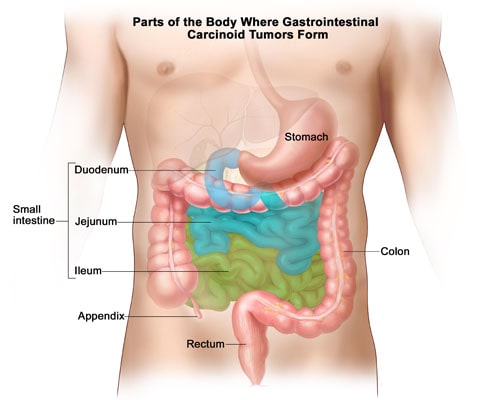
What is a Gastrointestinal Carcinoid Tumor?
These Gastrointestinal carcinoid tumors are a type of cancer that occurs in the lining of the gastrointestinal (GI) tract. Cancer occurs when cells begin to grow out of control and become cancerous in nature. Cells in any part of the body can become cancerous.
What is the Gastrointestinal System?
The gastrointestinal (GI) system, it is also known as the digestive system, it helps in digestion of food which provides energy to the body and get rid of solid waste from the body. When food is chewed and swallowed, then it enters the esophagus. Esophagus carries food through the neck and chest to the stomach. The esophagus joins the stomach just beneath the diaphragm (which acts as a breathing muscle under the lungs). The stomach is a sac-like organ which holds food and begins the digestive process by secreting gastric juice. Then food and gastric juices are mixed into a thick fluid, which then empties into the small intestine.
Where small intestine continues breaking down food and absorbs most of the nutrients from it. It is the longest part of the gastrointestinal (GI) tract, measuring more than 20 feet in length. The small intestine then joins the colon. Which is a wider, muscular tube about 5 feet long in length? Appendix occurs near the junction of small intestine and colon. The colon absorbs most of the water and mineral nutrients from food and serves as a storage place for waste to be removed. The waste left after this process enters into the rectum. From there it passes out of the body through the anus as stool or faeces.
The Diffuse Neuroendocrine System of the Body
Carcinoid tumors start from cells of the diffuse neuroendocrine system of the body. Neuroendocrine system consists of cells that are like nerve cells in certain ways and like hormone-making endocrine cells in other ways and so have twin functionality. These cells don’t form an actual organ like the adrenal or thyroid glands but they are scattered throughout other organs like the esophagus, stomach, pancreas, intestines, and lungs. Our digestive system is very large and has more neuroendocrine cells than any other part of the body. This is the reason why carcinoid tumors most often start in the digestive system.
The Neuroendocrine cells help control the release of digestive juices and how fast food moves in our GI tract. They also help control the growth of other types of digestive system cells.
Neuroendocrine Tumors
Like most cells in our body, GI tract neuroendocrine cells can sometimes go through certain changes that cause them to grow too much and form tumors and makes them cancerous. These tumors are called as neuroendocrine tumors (NETs) and neuroendocrine cancers. In past, abnormal growths of neuroendocrine cells were called carcinoids. In 2000, the World Health Organization (WHO) reclassified carcinoids neuroendocrine tumors and neuroendocrine cancers.
Neuroendocrine tumors are generally growths that look mostly benign but can possibly spread to other parts of the body. These cancers are abnormal growths of neuroendocrine cells which can spread to other parts of the body and make them affected with abnormal growth.
Neuroendocrine cancers (also known as neuroendocrine carcinomas) are divided into groups based on the way the cells look under a microscope:
Well-differentiated neuroendocrine cancers have cells that do not look very abnormal in nature and are not multiplying rapidly. These tumors tend to grow and spread slowly in nature. Well-differentiated neuroendocrine cancers mostly look identical to benign neuroendocrine tumors when seen under the microscope. To know for certain that a mass is a neuroendocrine cancer (and not a benign tumor) is when it spreads to other organs or tissues. Poorly-differentiated endocrine cancers tend to grow and spread quickly.
What is Carcinoid Tumor?
Carcinoid is the term used to explain less to moderately-differentiated neuroendocrine tumors in the stomach, intestine, appendix, rectum, and lung.
Neuroendocrine tumors and cancers act like the cells they come from their origin, often releasing certain hormone-like substances into the bloodstream. Most common symptoms of the carcinoid syndrome include flushing (redness of the skin with a feeling of warmth), wheezing, diarrhea, and a fast heartbeat.
Symptoms of Gastrointestinal Carcinoid Tumor
For Duodenum:
The duodenum is the first part of our small intestine, which connects to the stomach. Signs and symptoms of GI carcinoid tumors in the duodenum might include:
- Abdominal pain
- Constipation
- Diarrhea
- Change in stool color
- Nausea
- Vomiting
- Jaundice
- Heartburn
For Jejunum:
The jejunum is the middle part of the small intestine and Ileum (Signs and symptoms of GI carcinoid tumors in the jejunum and ileum may include:
- Abdominal pain
- Weight loss for no known reason
- Feeling very tired
- Feeling bloated
- Diarrhea
- Nausea
- Vomiting
For Colon:
Signs and symptoms of GI carcinoid tumors in the colon:
- Abdominal pain
- Weight loss for no known reason
For Rectum:
Signs and symptoms of GI carcinoid tumors in the rectum:
- Blood in the stool
- Pain in the rectum
- Constipation
Cancer in Ayurveda
Vata dosha is responsible for cell division. Aggravation of Vata dosha and suppression of Kapha doshas or both the doshas interacting with one another may result in the proliferation of cells. However, the Ekadesavriddhi (growth at specific part) is a part of abnormal cell division resulting in benign or malignant tumors. Acharya Sushruta has explained about six stages in the pathogenesis of all diseases. They are Sanchaya, the early stages of localized neoplastic changes; Prakopa is the transformation of primary growths into metastatic tumors, Prasara is metastasis; Sthana samsraya is complete metastasis and secondary growth. Vyakti is the clinical signs and symptoms observed. Bheda is the stage where differentiation of growth is understood on the basis of histopathology.
Herbal Remedies for Gastrointestinal Carcinoid Tumor by Planet Ayurveda
At Planet Ayurveda we are providing Crab Care Pack which have effective herbal medicines which control the pitta dosha and helps in normalized function of it. Provide support to control uncontrolled cell growth and helps in its treatment.
DOSAGE
- Ashwagandha Capsules: 2 capsules to be taken two times in a day with warm water after meals.
- Guggul capsules: 2 capsules to be taken two times in a day with warm water after meals.
- Curcumin Capsules: 2 capsules to be taken two times in a day with warm water after meals.
- Tulsi Capsules: 2 capsules to be taken two times in a day with warm water after meals.
- Chanderprabha Vati: 2 tablets to be taken three times in a day with warm water after meals.
- Kanchnaar Guggul: 2 tablets to be taken three times in a day with warm water after meals.
Products Description
1. Curcumin Capsules
Curcumin capsules has the main active ingredient in turmeric. It has very powerful anti-inflammatory effects and is also a very strong antioxidant. It has great anti- carcinogenic properties. Curcumin is a potent antioxidant that can neutralize free radicals from the body. Curcumin Boosts Brain-Derived Neurotropic Factor. Turmeric is helpful in Preventing (And Perhaps Even Treat) Cancer. Curcumin is also useful in Preventing and Treating Alzheimer’s disease. Arthritis Patients Respond Very Well to Curcumin Supplements.
2. Ashwagandha Capsules
Ashwagandha capsules contain Standardized extract of herb Ashwagandha (Withania somnifera) is used to prepare these capsules. Ashwagandha helps to manage pain. Ashwagandha Supports sustained energy levels, strength, and vitality, including with physical activity of the human body.it supports a healthy joint and Promotes thyroid health. It also Supports a healthy immune system and Calms mental processes and Fosters healthy sleep patterns.
3. Tulsi Capsules
Tulsi is an herb which helps in boosting the immune system. It has great anti-oxidant properties and helps in controlling and killing carcinogenic cells. Basil has eugenol as an essential extract that helps fight cancer. Tulsi’s has great therapeutic properties which have been discussed at great length in ancient Ayurveda texts in India and its many uses have been told in Ayurvedic texts.
4. Kanchnaar Guggul
Kanchnaar guggul is herbal medicines which control unwanted growths of cells and control the inflammation. It helps in curing carcinogenic growths. The product is packed with Kanchnaar bark (Bauhinia variegate), Triphala (Terminalia chebula, Terminalia belerica, and Emblica officinalis), Trikatu (Zingiber officinalis, Solanum nigrum, and Piper longum), Varun bark (Crataeva nurvala), Elaichi (Eletteria cardamom), Dalchini (Cinnamomum zeylanica), Tej patra (Cinnamomum zeylanica leaves) and Guggul (Commiphora mukul). The main ingredients are Kanchnaar bark and Guggul.
5. Chandraprabha Vati
It is used in the Ayurvedic treatment of urinary tract infection, difficulty in urination, urinary calculi. It helps to treat constipation, bloating, abdominal colic pain, low back pain. It is very useful in treating cold, cough, rhinitis, bronchitis, asthma and such other respiratory diseases. It is also used to treat eczema, dermatitis, pruritus and allergic skin conditions. It is very useful to treat piles, liver, spleen diseases, anemia, and fistula. It also helps to relieve teeth problems like caries, eye infections. It is also used to treat semen defects and gynecological problems. It plays a good role to relieve indigestion, improves strength, it is also a natural aphrodisiac and anti-aging Ayurvedic medicine.
6. Guggul Capsules
Guggul inhibits the production of oxygen free radicals and thus protects several tissues against damage. Guggul inhibits platelet aggregation thus reducing clot formation similarly to other traditional drugs. Guggul has shown great effects against cancer by killing cancer cells, reducing cell growth, and decreasing the formation of new blood vessels Guggul prevented the proliferation of human leukemia cells. Guggul showed this activity on different cancer cells including leukemia, head and neck, breast, lung, and prostate cancer It caused cell death by activation of c-Jun N-Terminal kinase Guggul stopped cell growth in human head and neck cancer cells and killed cancer cells through STAT3 inhibition Guggul reduced MMP-9 production and tumor invasion in human breast cancer cells.
We at Planet Ayurveda prepare and offer a wide range of products for health- related issues and for the general wellbeing of health. Our products are 100% herbal and go through stringent tests to assure good results with no side effects. Our products are prepared under proper guidelines to serve people in an efficient and healthy way.

